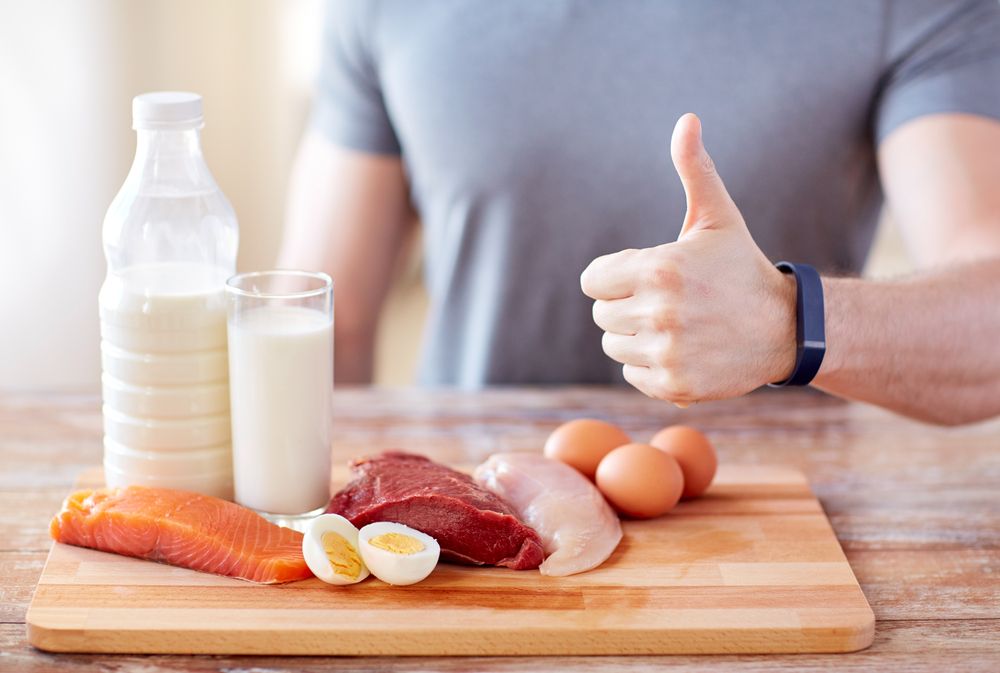Protein's significance as a vital nutrient extends beyond the exclusive realm of bodybuilders and athletes. It plays a crucial role in muscle development, healthy weight management, and fortifying the immune system. If you're contemplating increasing your protein intake, you may be curious about the appropriate amount and the indicators of insufficient protein consumption. Fortunately, we had a conversation with Destini Moody, RDN, CSSD, LD, a registered dietitian and sports nutritionist at Garage Gym Reviews, who addresses these precise questions and delves into ten unmistakable signs of inadequate protein intake.
But before we delve deeper, let's take a moment to revisit what you learned in your high school biology class. Protein, one of the three macronutrients essential for energy, undergoes a breakdown process into amino acids, the fundamental building blocks crucial for fueling your body, muscle growth, tissue repair, immune system support, and various other indispensable bodily functions.
With a caloric value of four calories per gram, the recommended dietary allowance (RDA) for protein in sedentary adults stands at 0.8 grams per kilogram or approximately 0.36 grams of protein per pound of body weight, as per guidelines from the United States Department of Agriculture (USDA). This translates to around 46 grams of protein for women and 56 grams for men on a daily basis. Now that we've established the importance of protein in your diet and the daily intake recommendations, continue reading to discover 10 unmistakable signs of inadequate protein consumption, as shared by Moody.
1) You struggle to put on muscle

If you encounter a stagnation in your muscle-building efforts, it could be indicative of insufficient protein intake. Building muscle entails more than just engaging in strength training exercises. According to research, an optimal protein consumption range for individuals aiming to build muscle falls between 1.6 to 2 grams per kilogram of body weight.
Moody highlights, "Many individuals striving to increase muscle mass often emphasize calorie intake to bulk up. However, without an adequate protein component within those calories, you may find yourself frustrated and potentially accumulating fat. Additionally, a protein deficiency can lead to a lack of progress or even a decline in strength."
2) You get sick frequently

If you frequently experience nasal congestion or persistently feel unwell, it could be an indication that your immune system is not functioning at its best due to inadequate protein consumption.
Moody clarifies, "A lesser-known fact is that antibodies, the molecules responsible for combating diseases within your immune system, are actually proteins. Regardless of the flu shot you've received this year, your immune system may struggle to protect itself against illnesses without a proper supply of protein."
3) You're always tired

Moody explains, "In the absence of sufficient protein intake, your body seeks out amino acids from alternative sources, leading to the breakdown of your muscle mass to fulfill its protein requirements. This muscle loss can result in weakness and a persistent sense of exhaustion." If you consistently experience fatigue, it may be necessary to reevaluate your protein consumption.
4) You experience mood swings

Mood swings might serve as a subtle sign of protein deficiency impacting the production of neurotransmitters. Neurotransmitters are vital chemicals that facilitate communication between brain cells, contributing to emotional stability.
Moody elaborates, "An inadequate protein intake can lead to overconsumption of carbohydrates, resulting in abrupt blood sugar fluctuations that may cause you to react irritably towards friends and colleagues seemingly without cause. Additionally, certain mood-controlling neurotransmitters in the brain rely on protein, so when protein levels are insufficient, it can influence your overall mood."
5) Your hair and nails are weak and brittle

Keratin, a structural protein essential for the growth, strength, and upkeep of hair and nails, relies on the availability of amino acids. Inadequate protein consumption can hinder the production of sufficient keratin, affecting the quality of your hair and nails.
Moody emphasizes, "Collagen and keratin, two vital proteins, play a pivotal role in maintaining the health of your hair, skin, and nails. Ensuring an adequate intake of dietary protein contributes to the luster of your hair, the strength of your nails, and the softness of your skin."
6) You're always hungry

Research indicates that protein is the most satisfying of all macronutrients, promoting a prolonged feeling of fullness and aiding in the suppression of cravings. Moody suggests, "Incorporating protein into the majority of your meals and snacks is an effective approach to sustain satiety throughout the day. Consider combining protein, fats, and carbohydrates for a well-rounded and satisfying meal or snack."
7) You have anemia

Anemia is frequently linked to a lack of iron, but it can also be a consequence of inadequate protein intake. The National Institutes of Health (NIH) highlight that the production of hemoglobin, a critical component for oxygen transport, relies on the presence of protein.
Moody clarifies, "Iron deficiency takes on various forms, with hypoproteinemia being a condition characterized by very low protein levels in the bloodstream. Consistently including protein-rich foods in your daily diet can be beneficial in addressing iron deficiency. If you're uncertain about the specific type of iron deficiency you might have, it's essential to undergo further blood tests and seek guidance from a registered dietitian or physician."
8) You're losing muscle mass

The loss of muscle mass is a common aspect of the natural aging process; however, it can also serve as an indicator of insufficient protein consumption. Consistent strength training demands a consistent daily protein intake to promote muscle growth. Studies indicate that an effective strategy for building and preserving muscle mass involves the consumption of 25 to 30 grams of high-quality protein distributed evenly throughout the day.
Moody emphasizes, "Adequate dietary protein intake plays a crucial role in preserving muscle condition and preventing muscle atrophy or decline. Regardless of one's objectives, maintaining muscle mass should be a primary concern for overall health and well-being."
9) You struggle to lose weight

When you find that your weight remains stagnant on the scale, insufficient protein intake may be undermining your efforts to lose weight. Harvard Medical School points out that protein has a significant thermic effect, implying that it demands more calories for digestion compared to carbohydrates or fats.
Moody explains, "In cases where individuals fall short on protein consumption, they might experience increased hunger or reduced satisfaction, which can lead to the consumption of high-calorie alternatives over time, ultimately contributing to weight gain."
10) You have weak bones

"Protein plays a crucial role not only in muscle health but also in maintaining strong bones," asserts Moody. "Engaging in consistent strength training and ensuring sufficient daily protein intake can have a beneficial impact on bone health." The American Society for Nutrition highlights that numerous studies suggest that higher protein consumption can enhance bone density and reduce the risk of fractures, irrespective of the source of protein.

